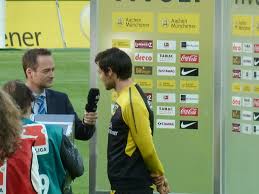


Posted January 8, 2015
At this time of the year the media focus moves away from the boardroom and onto the sports field. That makes it a good time to look at the needs of our elite players when it comes to media interviews.
 The first tip I would give them is to look at the interviewer when answering questions. Many don’t do this, but it’s important. That’s because you can seem disinterested to the viewer at home if you are not making eye contact with the person asking the questions. This is something we focus on in our media training workshops.
The first tip I would give them is to look at the interviewer when answering questions. Many don’t do this, but it’s important. That’s because you can seem disinterested to the viewer at home if you are not making eye contact with the person asking the questions. This is something we focus on in our media training workshops.
The second tip I would give is how to survive post-match interviews. Obviously there is little time to prepare for these. But it is usually possible to take a minute beforehand and think about something you would like to say. This gives you an element of control and a way to deflect any difficult questions.
For example, if Ritchie McCaw had a bad game during a heavy loss and an All Black team mate was asked in a post-match interview how he thought his captain played, he may not want to answer. But if he had thought of something interesting to say just before the interview started, he could deflect to that point and satisfy the reporter at the same time. For example:
Reporter: How did you think McCaw played today?
Player: Ritchie always leads from the front, but I thought that (another player) stood out today with his defence and showed exactly why he is probably the world’s best player in his position.
As long as the new point is interesting, the reporter should be comfortable with the deflection.
Another common thread among many sportspeople is the overuse of Ums and Ahs. There’s no need to eliminate them totally, but they should be limited. A good way to help is a simple exercise. This works by picking an object around the room you are in and talking about it for 30 seconds. The only requirement is to avoid Ums and Ahs. The more you do this exercise, the less Ums and Ahs you will use.
It’s important for sports stars to come across well in media interviews. It opens up more career opportunities when they retire. It’s also vital for the sports represent. If they show the sport in a good light, more people will either take up that sport or start following it.
For more on my media training or crisis communication workshops, contact [email protected] or 029 200 8555.